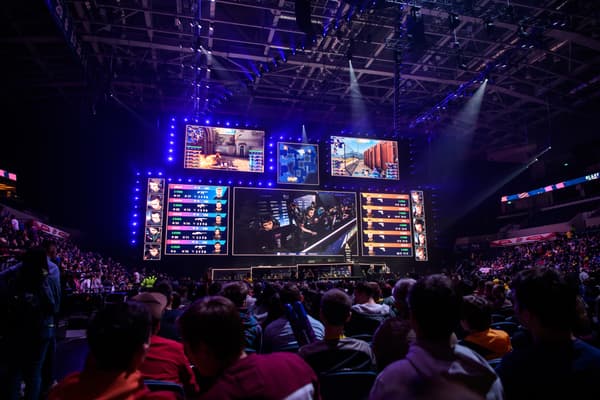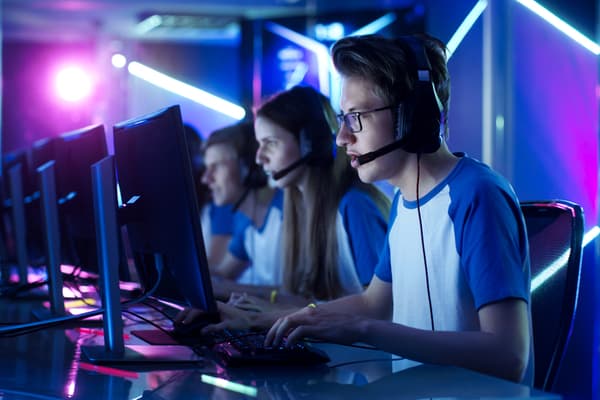Program Overview

The Esports Management Associate degree curriculum draws on faculty expertise throughout the university to offer students an interdisciplinary experience in the esports industry, sport management, information technology, and digital media production.
After developing skills in these areas, students can explore career options within the esports arena, collegiate esports, major esports teams, and affiliated organizations.
This curriculum involves studying management, game design, audio and video production, marketing and incorporates the computer and interpersonal skills essential for initial employment in the esports industry in business administration, event, and esports positions.
Reflecting today’s workplace, the associate degree in Esports Management combines primarily face-to-face instruction with online learning experiences. Hands-on training is key to the esports management program.
Graduates of this program can continue their education with a Bachelor of Science degree in Business Management.
Read MoreFull Description
What is Esports Management?
Esports is a worldwide entertainment realm that involves competitive video gaming. Esports management deals with other supportive aspects of esports. This covers operations including management of a varsity esports program, esports event management, strategic planning, content development, social media management, and more.
Career Prospects in Esports
Over the years, esports has become a significant part of the global sports domain. It has emerged as a separate area of expertise, where an esports player showcases their video games talent and competes against international counterparts in competitive worldwide video games contests.
The growth of esports companies along with growing public interest make esports management a promising mainstream career alternative. Esports professionals can work with video game companies in various positions that deal with operational, administrative, marketing, and strategic aspects of the business.
Associate in Science Degree in Esports Management (MGEA)
The Associate in Science Degree in Esports Management (MGEA) is a comprehensive associate degree program and a promising opportunity for budding esports professionals to enter the field of esports management. The course prepares you for careers in the esports field, especially in administration and management.
After completing the course, you are likely to develop an innovative and strategic thought process, agility, problem-solving abilities, and the capability to manage tasks efficiently.
We offer the program in a hybrid model, which means on-campus meetings and online synchronous conferencing, such as Zoom, or asynchronous online instruction and assignments through our learning management system. You can also take 100% of your general education courses online.
To successfully earn your esports college degree, it is important to maintain cognitive abilities, adaptive abilities, as well as interpersonal and effective communication skills.
Unique Program Features
The associate degree program offers unique features, including:
- Integrated and comprehensive curriculum
- Experiential learning
- Exposure to live events
- Focus on developing hands-on experience
Potential Career Opportunities
The Associate in Science degree program in Esports Management helps develop capabilities that turn students into professionals, ready to take on the challenges of the esports space. The associate graduate program may qualify students to work in various positions across the esports industry, including:
Esports marketing representative
Esports business development executive
Esports operations coordinator
Social media content creator
Esports events coordinator or promoter
Fan engagement or client relations representative
Communications coordinator
Esports manager
Varsity esports team organizer
FAQ
-
I Have Not Earned My High School Diploma or GED: Can I Enroll in an Esports Associate Degree Program?
You must be a high school graduate or a recognized equivalency diploma (GED) or meet the federal homeschool requirements to enroll in an esports associate degree program.
-
How Long Will It Take Me to Complete My Esports Program?
To finish your degree requirements in the shortest time possible, you should take the courses listed in the advised curriculum. A student may complete a typical six-term curriculum requirement in just 18 months.
You can be sure to fulfill your degree requirements in this 18-month window if you take at least one liberal arts class every term. Those who require more time may selectively defer courses until the completion of their technical requirements.Two additional study terms are available to complete general education requirements with no extra tuition assessment costs. Students must pay these additional costs in full.
During Intersession, a four-week term scheduled between Spring and Summer Quarters, students may choose to complete select liberal arts requirements.We will assess additional tuition costs for students who choose to extend the number of hours of course time needed for completing a certificate in technical subjects.
-
Can I Transfer the Esports Credits That I Earn at NEIT to Another College?
The ability to transfer credits depends on the new institution. Students who want to transfer their credit hours should connect with the Office of Teaching and Learning for further information.
-
How Important Is Attendance for the Esports program at NEIT?
According to recent data, missing two or more class meetings of a course during a term often results in failing the course. Except for emergencies, NEIT expects you to attend all classes, whether they are conducted on campus or virtually.
It is especially important to be present during your first class to understand the course expectations and schedule.
Absences have an even more severe impact in courses that use learning teams. You must communicate all absences to the professor and any team member as soon as possible.
-
Where Will Esports Job Opportunities Exist?
Graduates have found employment in the local esports sector. The program also helps students develop abilities to look for global employment opportunities and international experiences.





